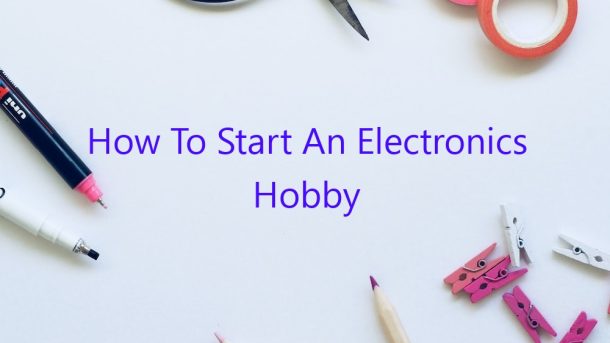Do you want to start an electronics hobby? It can be a lot of fun, and there are many different things you can do in the world of electronics. In this article, we’re going to teach you the basics of getting started.
First, you’ll need to get some supplies. You’ll need some basic tools, such as a soldering iron and solder, as well as some electronic components. You can find these at your local electronics store, or online.
The next step is to learn the basics of electronics. There are many different concepts to learn, but don’t worry, we’ll walk you through them. The first thing you’ll need to know is how to read a schematic diagram. A schematic diagram is a diagram of a circuit, and it shows how the different components are connected.
Next, you’ll need to learn about resistors, capacitors, and inductors. These are the basic components of an electronic circuit. Resistors are used to control the flow of electricity, capacitors store energy, and inductors are used to create circuits with a high frequency.
Once you’ve learned the basics, it’s time to start building circuits. There are many different circuits you can build, and the possibilities are endless. You can build circuits to control lights, motors, or anything else you can imagine.
The final step is to have some fun. Electronics can be a challenging and rewarding hobby, and there’s always something new to learn. So get out there and start building circuits!
Contents
How do I get an electronic hobby?
When it comes to hobbies, many people think of activities like painting, gardening, or cooking. But what if you’re looking for a hobby that’s a bit more electronic? If you’re wondering how to get an electronic hobby, here are a few ideas to get you started.
One great way to get into electronics is to start by working on simple projects. There are plenty of online resources that can walk you through the basics of building things like electronic circuits or programming microcontrollers. If you’re not sure where to start, websites like Instructables and Sparkfun are a great place to start.
Another great way to get into electronics is to join a makerspace. A makerspace is a community workshop where people of all ages come together to share their skills and knowledge in a variety of disciplines, including electronics. Makerspaces usually have a range of tools and equipment available for members to use, so it’s a great place to learn about and experiment with electronics. To find a makerspace near you, check out the Makerspace Directory.
If you’re looking for a more structured learning environment, you might want to consider enrolling in a course or program in electronics. There are a number of schools and colleges that offer courses in electronics, and there are also a number of online courses available. If you’re looking for a course that’s specific to electronics, check out the Electronics & Robotics program from the University of Texas at El Paso.
Whatever route you choose, remember that learning about electronics can be fun and rewarding. So get out there and start tinkering!
Can you learn electronics as a hobby?
Yes, you can learn electronics as a hobby. In fact, there are many different ways you can go about it. You can take classes, read books or articles, watch videos, or even just try to figure it out on your own.
One of the best ways to learn electronics is to take classes. Community colleges and universities often offer classes in electronics, and there are also many online courses available. If you take a class, you’ll learn the basics of electronics, including how to read schematics, how to use a multimeter, and how to solder.
If you don’t want to take a class, you can still learn electronics by reading books or articles. There are many books and articles on the subject, and they can teach you everything from the basics to more advanced topics.
Another way to learn electronics is to watch videos. There are many great videos on YouTube and other video sites that can teach you about electronics.
Finally, you can learn electronics by trying to figure it out on your own. This can be a bit more difficult, but it’s definitely possible. There are many resources available online, such as websites, forums, and even online courses.
So, can you learn electronics as a hobby? Yes, you can. There are many different ways to learn, and there are plenty of resources available. Start with one of the methods mentioned above and see where it takes you.
What electronics should I learn first?
When it comes to learning electronics, there are a lot of different things to choose from. So, what electronics should you learn first?
The basics
If you’re just starting out, the best place to start is with the basics. This includes learning about the different types of components, how they work, and how to connect them together. You’ll also need to learn about voltage and current, and how to use a multimeter.
Once you have the basics down, you can start learning about more advanced topics, such as semiconductors and microcontrollers.
schematic symbols
If you’re looking to get into DIY electronics, you’ll also need to learn about schematic symbols. These are the symbols that are used to represent different components in a schematic diagram. By learning about these symbols, you’ll be able to understand schematic diagrams, which will allow you to build your own circuits.
Soldering
Soldering is another important skill to learn if you’re interested in DIY electronics. It’s not essential for all projects, but it can be useful for connecting components together. There are a lot of different techniques for soldering, so it’s a good idea to practice a few different techniques until you find one that you’re comfortable with.
Programming
If you want to take your electronics projects to the next level, you’ll need to learn how to program microcontrollers. This can be a challenging task, but it’s worth it if you want to create more complex projects. There are a lot of different programming languages to choose from, so it’s a good idea to choose one that you’re comfortable with.
These are just a few of the things you need to learn when starting out in electronics. There are a lot of other things to learn, but these are a good place to start.
Where do I start learning electronics?
There is no one-size-fits-all answer to this question, as the best way to learn electronics depends on your specific interests and goals. However, here are a few general tips to get you started.
If you’re interested in learning about the basics of electricity and electronics, one good place to start is with the books of Tom Bearden, such as “Energy from the Vacuum.” These books will introduce you to the concepts of electricity and electromagnetism, and how they can be used to create new and useful technologies.
If you’re interested in learning about how to build electronic circuits, one good way to start is by studying the theory behind circuits, and then building and testing simple circuits. One great resource for this is the book “Make: Electronics,” by Charles Platt. This book will teach you the basics of circuit theory, and then show you how to apply that knowledge by building a variety of simple circuits.
If you’re interested in learning more about how to use electronic components, one good way to start is by studying the datasheets for those components. A datasheet will tell you the electrical specifications for a component, such as the voltage and current ranges it can handle, as well as the maximum power it can dissipate. Once you have a good understanding of the electrical specifications for a component, you can start to design circuits that use that component.
Finally, if you’re interested in learning about how to design and build your own circuits, one good way to start is by studying the schematic diagrams for those circuits. A schematic diagram will show you the layout of a circuit, as well as how the various components are interconnected. Once you have a good understanding of how a circuit works, you can start to design your own circuits.
What are the basics of electronics?
What are the basics of electronics?
First and foremost, electronics is the study of how to control electric currents. In other words, it’s the study of how to make things work using electricity. This can include everything from simple tasks like turning on a light switch to more complicated tasks like building a computer.
One of the most important things to understand about electronics is that it’s all about controlling electric currents. This means that in order to understand electronics, you need to understand some basic concepts about electricity.
For example, what is electric current? Electric current is the flow of electricity through a conductor. In other words, it’s the flow of electrons. You can think of it as the flow of water through a pipe. Just like water can flow through a pipe, electrons can flow through a conductor.
Another important concept to understand is voltage. Voltage is the measure of how much electric potential energy exists in a given area. In other words, it’s the measure of how much electricity is pushing or pulling on the electrons in a given area.
One way to think of voltage is to think of it as water pressure. Just like water pressure can push or pull on water, voltage can push or pull on electrons.
The higher the voltage, the more force it will have on the electrons. This means that the higher the voltage, the more electricity will flow through the conductor.
Now that you understand some of the basics about electricity, let’s take a look at some of the basics about electronics.
The first thing you need to understand about electronics is that it’s all about controlling electric current. This means that in order to understand electronics, you need to understand some basic concepts about electricity.
For example, what is electric current? Electric current is the flow of electricity through a conductor. In other words, it’s the flow of electrons. You can think of it as the flow of water through a pipe. Just like water can flow through a pipe, electrons can flow through a conductor.
Another important concept to understand is voltage. Voltage is the measure of how much electric potential energy exists in a given area. In other words, it’s the measure of how much electricity is pushing or pulling on the electrons in a given area.
One way to think of voltage is to think of it as water pressure. Just like water pressure can push or pull on water, voltage can push or pull on electrons.
The higher the voltage, the more force it will have on the electrons. This means that the higher the voltage, the more electricity will flow through the conductor.
Now that you understand some of the basics about electricity, let’s take a look at some of the basics about electronics.
The first thing you need to understand about electronics is that it’s all about controlling electric current. This means that in order to understand electronics, you need to understand some basic concepts about electricity.
For example, what is electric current? Electric current is the flow of electricity through a conductor. In other words, it’s the flow of electrons. You can think of it as the flow of water through a pipe. Just like water can flow through a pipe, electrons can flow through a conductor.
Another important concept to understand is voltage. Voltage is the measure of how much electric potential energy exists in a given area. In other words, it’s the measure of how much electricity is pushing or pulling on the electrons in a given area.
One way to think of voltage is to think of it as water pressure. Just like water pressure can push or pull on water, voltage can push or pull on electrons.
Is Arduino a good hobby?
Arduino is a good hobby for people who are interested in electronics and programming. Arduino is an open-source electronics platform based on easy-to-use hardware and software. It’s intended for anyone making interactive projects.
Arduino can be used to control almost any electronic device. You can use it to create your own devices or to control preexisting devices. Arduino also makes it easy to program your devices. You can use Arduino to control devices that are connected to the internet or to devices that are not connected to the internet.
Arduino is a good hobby for people who want to learn about electronics and programming. Arduino is also a good hobby for people who want to create their own devices. Arduino is an easy-to-use platform that makes it easy to create your own devices.
How do you start a circuit?
When starting a circuit, you first need to find the breaker box. The breaker box is usually in the garage, basement, or closet. Once you’ve found the breaker box, you need to find the breaker that corresponds to the circuit you’re working on.
Next, you need to find the on/off switch for the circuit. The on/off switch is typically in the same room as the breaker box. After finding the on/off switch, you need to turn it off.
Now, you need to remove the fuse or unscrew the circuit breaker. After removing the fuse or unscrewing the circuit breaker, you need to reattach it to the “off” position. Finally, you need to turn on the breaker box and test the circuit.




